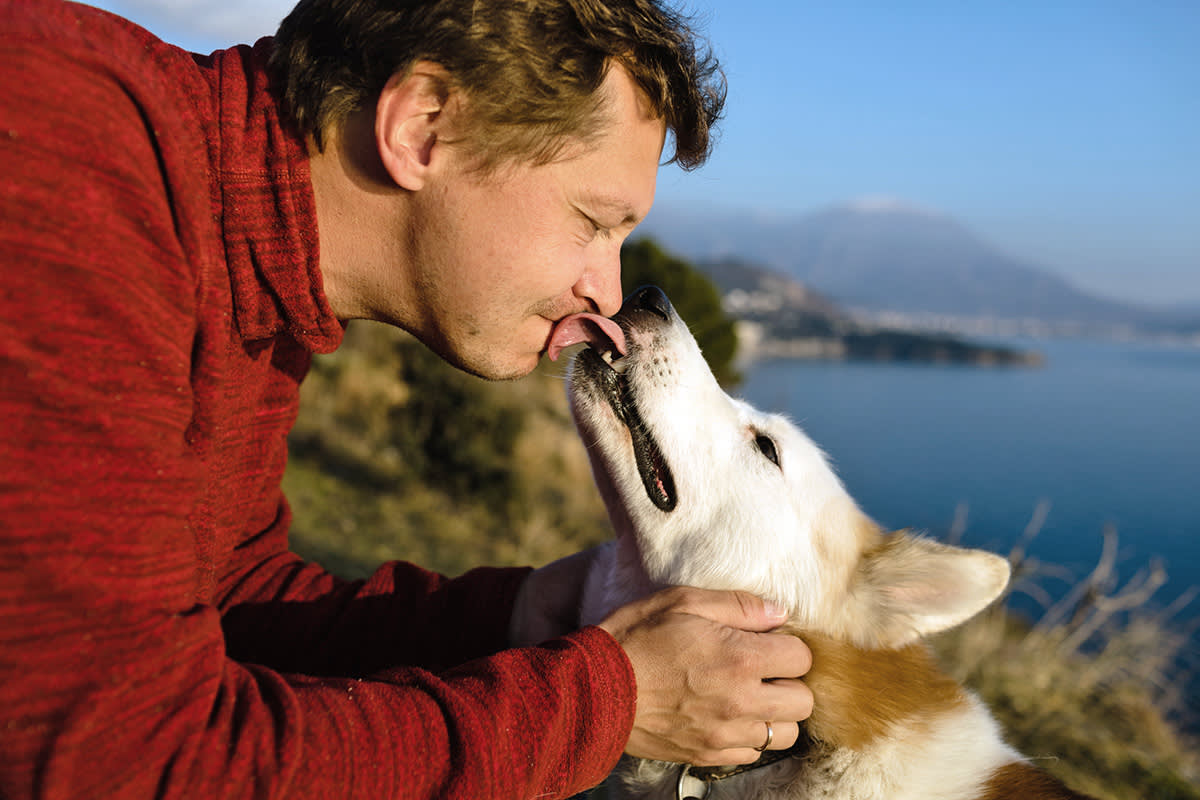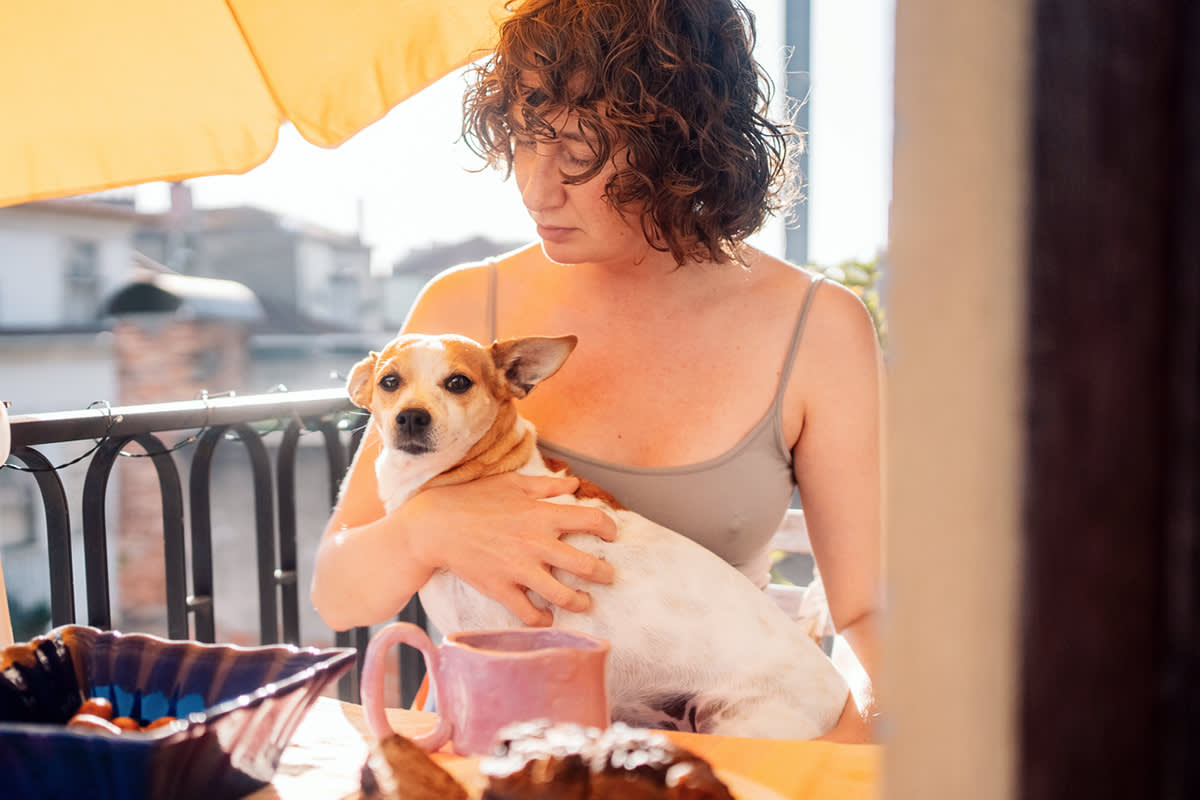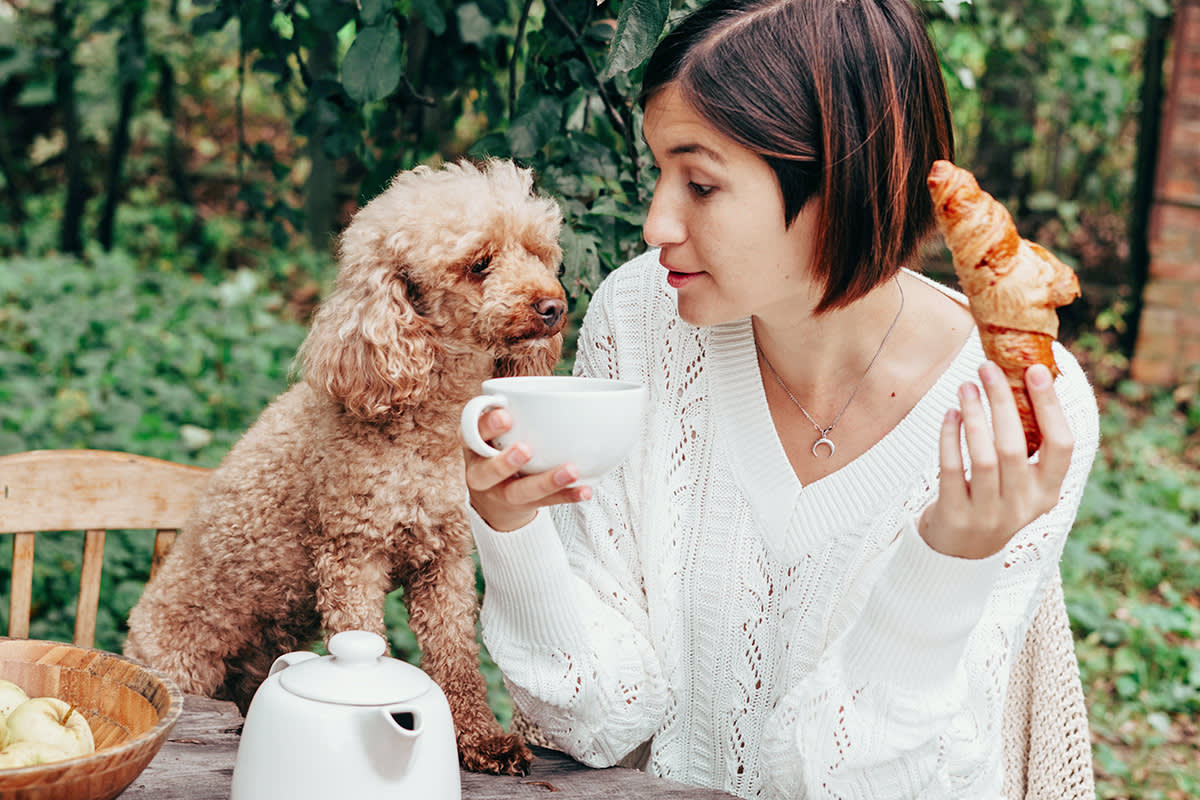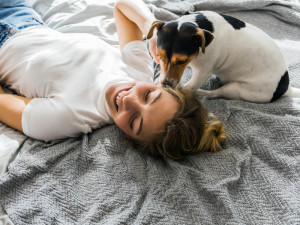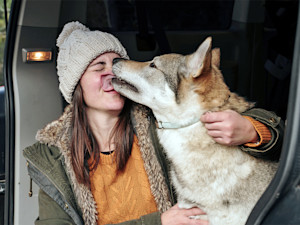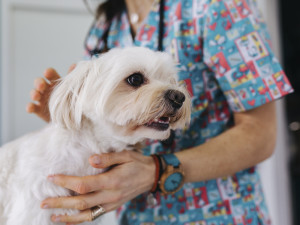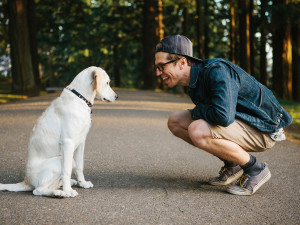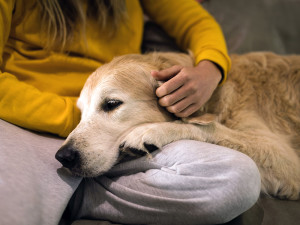5 Ways Your Dog Could Be Putting You at Risk for a Bacterial Infection
Should we let dogs lick our face? Is it safe to wash the family dog in the bathtub? We asked the experts.
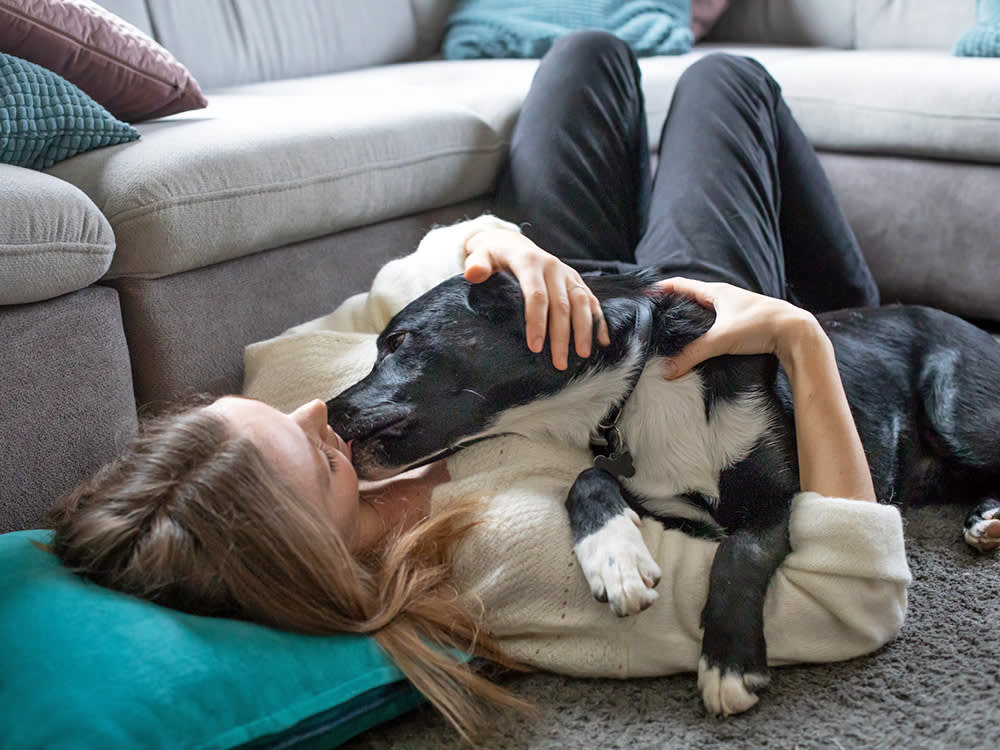
Share Article
We all love our dogs, but let’s face it: They can be kind of grody. At least once per week, my younger pup will try to plant a big, wet kiss on me right after licking her own hind quarters. In those moments, it’s easy to say, “Thanks, but no thanks.” But how risky is living with a dog, anyway?
Lately, we've been hearing a lot of buzz about dogs and hygiene. On Chelsea Handler's podcastopens in new tab, she and Kevin Hart had it out about whether it’s kosher to bathe your dog in your shower or tub, and a November 2024 studyopens in new tab found that dogs can potentially transmit Salmonella if you let them lick your face. Yikes.
But do our dirty dogs really put us at risk? Or is the “ick” factor more philosophical than it is practical? According to Mark Verdinoopens in new tab, senior vice president and chief of veterinary staff for North Shore Animal League America, the risk of getting a bacterial infection from our pets is very low. “For the record, my dogs lick my face, sleep in our bed, etc., and I generally don’t think twice about it,” he tells Kinship.
However, Dr. Rebecca Lee Smithopens in new tab, a veterinary epidemiologist and associate professor for the University of Illinois’ College of Veterinary Medicine, cautions that “nothing is 100 percent safe,” so it’s best to always wash your hands after handling your pet and disinfect surfaces that may be contaminated. “At the very least, wash your hands before eating, preparing food, or changing tampons/menstrual cups/contacts/anything else that goes in your body,” she says.
Verdino advises wiping dogs’ feet after they go outside with something like unscented baby wipes (and doing the same for cats after they use the litter box). He adds, if you accidentally touch your pets butt, (you guessed it) wash your hands.
So, as long as you practice basic cleanliness, you shouldn’t find yourself re-enacting the events of Osmosis Jonesopens in new tab. But just in case, we broke down some of the most potentially germy scenarios.

Forgetting to disinfect cuts and bites
If you notice any cuts, scratches, or bites after you play with your pet, disinfect them as soon as possible — especially if the bite or scratch breaks the skin. Leaving wounds unattended “would allow a portal for bacteria to invade the skin and cause an infection,” Verdino says. For the record, that goes for cats as well: “Cat bites are particularly problematic since their teeth are quite sharp and can penetrate deeply like a needle,” Verdino notes.
Regardless of the species, deeper bites, especially puncture wounds, will require medical care. “Remember that your pets’ mouths and paws have a lot of bacteria on them, even at normal times,” Smith says. “You don’t want that inside your body.”
Failing to clean up dog poop
None of us would leave dog poo on the living room floor (I hope), but leaving pet waste in your backyard is a no-no as well. If your yard becomes a fecal minefield, someone might step in a big, nasty pile, possibly with bare feet, and track it inside. Also, we all know that some dogs view feces as a tasty treat. Why tempt fate?
“Cleaning up pet waste is one of the most important things pet owners can do to keep their family and community healthy,” Smith says. “Be sure to wash your hands after, though!”
Although they’re not bacteria, Verdino notes, “Some animal parasites can be zoonotic and transmitted to people.” In the case of cat feces, Toxoplasma poses a specific risk for pregnant women. Because of this, he says that “pregnant women should avoid changing the litter box and/or have their cats screened for [toxoplasmosis].”
Allowing your dog to “counter-surf” without sanitizing
Some dogs love to scope out the items on the counter by standing on their hind legs and placing their paws on the countertop. As cute as this behavior might be, those dirty feet do not make for ideal seasoning. Whatever’s on our pets’ paws could be transmitted to the counter and, ultimately, to the food we prepare on top of it.
“Pet feces contains E.Coli,” Verdino says, “which is a primary food-borne pathogen for people.” In layman’s terms? “Poop plus food equals bad.” If you catch your dog pawing the countertops or have a cat who likes to use them as a catwalk, disinfect all affected surfaces before cooking. Your dinner guests will surely thank you.
Letting your dog lick your face
Let’s be honest: Dog kisses, though adorable, are not the most sanitary thing in the world. As Smith notes, our beloved mongrels “eat a lot of things that we wouldn’t want on our faces, especially because faces are such a susceptible part of our body. We have a lot of openings (mouth, eyes, nose) that could be at risk from bacterial transmission.”
But if you can’t keep your pup from, uh, expressing their love sometimes, don’t freak out. Smith and Verdino agree that the risk of contracting a bacterial infection from a sloppy, wet kiss is fairly low — as long as you aren’t immunosuppressed, pregnant, ill, and don’t have any open wounds on your face.
Bathing your dog in the family tub without disinfecting
Although Hart and Handler may have some notes, Verdino and Smith both say that giving your dog the spa treatment shouldn’t put you at much risk. Clean the tub afterward, obviously (it’ll probably be covered in gray, sandy gook). Microbiologist Jason Tetroopens in new tab, aka “the Germ Guy,” told HuffPostopens in new tab that the “microbial nature of dogs is pretty harmless” but that you should still sanitize your bath and shower space after your pup has been there.
“Because of the risk of pathogens, the best thing to do is disinfect the tub so that any pathogens that might have been left behind are killed,” he said. “Make sure to follow the label and let the disinfectant sit for as long as directed.”
But Smith isn’t convinced you need to break out the bleach and disinfect every time — unless you or your pet has a known infection or an open wound. So, really it’s up to you (if you’d rather play it safe, whipping out some disinfectant every time wouldn’t hurt).
Can a dog’s bacterial infection spread to humans?
While some “generalist” bacteria species can cross over to humans, Verdino notes that animal-to-human transmission of zoonotic diseases (amusingly, also called “zoonoses”) is rare. Assuming you’re not immunosuppressed, keep your dog groomed and up to date on their preventive medications, wash pet bedding regularly, and — say it with me — wash your hands, and you should be fine.
Pet parents with weakened immune systems will be at slightly higher risk for crossover. In those cases, VCA Animal Hospitalsopens in new tab recommends practicing all the habits listed above, as well as avoiding direct contact with pet waste and watching your animals for any signs of illness.
Can dogs get bacterial infections from humans?
As with people, VCA Animal Hospitals reports that immunosuppressed animals will be at higher risk. Even then, however, Verdino says the risk of pet-to-human transmission is still rare.
“The only cases I have seen is when people in the house have been diagnosed with a resistant bacterial infection like MRSA,” Verdino says. “I have seen the MRSA get onto the pets (even if the pets are clinically normal), and then the pets can serve as a reservoir for re-infection of the people.”
If you remember one piece of advice from this article, never forget these three very important words: Wash. Your. Hands.
References
Kenney, Sophia M., et al. “Antimicrobial Resistance and Zoonotic Potential of Nontyphoidal Salmonella from Household Dogs.” Zoonoses and Public Health, 15 Nov. 2024, https://doi.org/10.1111/zph.13174opens in new tab.
Richards, Kimberley. “Is It Safe to Bathe Your Dog in Your Shower or Bathtub? Experts Weigh in on Germs.” HuffPost, 13 Nov. 2024, www.huffpost.com/entry/dog-bath-shower-germs-safety_l_6733a2c0e4b0d36d5d63cd16opens in new tab.
“Zoonotic Diseases in Dogs.” Vca_corporate, vcahospitals.com/know-your-pet/zoonotic-diseases-in-dogsopens in new tab.

Laura Bradley
Laura is a New York-based experienced writer and mom of two rescue pups. Her work has appeared in Slate, Vanity Fair, Daily Beast, The Washington Post, The Atlantic, Yahoo! News, Vulture, Grazia Magazine, and more. When she is not writing or walking the pooches, you will probably find her in the community garden.
Related articles
![A happy woman is lying on a bed, her dog smelling her face.]()
9 Diseases You Can (and Definitely Can’t) Catch From Your Dog
Here’s what you can scratch off your “Worry About This” list.
![Large dog licking woman's face in the back of her car.]()
Letting Your Dog Lick Your Face Could Be Dangerous, New Study Finds
Dogs can spread antibiotic-resistant salmonella to humans, scientists warn.
Can Humans Get Dogs Sick?
Think of the amount of tissues you’d need...
Does Your Dog Need a Flu Shot?
“Sick as a dog” isn’t just a phrase.
![man and lab puppy on park road]()
When, Exactly, Should You Vaccinate Your Puppy?
If it’s time for a round of shots (no, not that kind), follow this guide.
Can Dogs Get Fevers?
What to do to help them cool down and feel better.
